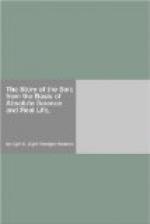Percy paused and said: “If I understand correctly these words of Lincoln, the land need not become poor. But I do not know why land becomes poor. I do not know what the soil contains, nor do I know what corn is made of. We plow the ground and plant the seed and cultivate and harvest the crop, but I do not know what the corn crop, or any crop, takes from the soil. I want to learn how to analyze the soil and crop and to find out, if possible, why soils become poor, in order, as Lincoln suggests, that the cause may be discovered and remedied.”
“It may be that the college professors could teach you in that way,” said the mother, “but you know the farm life is so full of work and so empty of mental culture.”
“I used to think so too,” said Percy, “but I fear we have worked too much with our hands and too little with our minds; that we have done much work in blindness as to the actual causes that control our crop yields; and that we have not found the mental culture that may be found in the farm life. Let me read again. These are Lincolns words:
“’No other human occupation opens so wide a field for the profitable and agreeable combination of labor with cultivated thought, as agriculture. I know nothing so pleasant to the mind as the discovery of anything that is at once new and valuable—nothing that so lightens and sweetens toil as the hopeful pursuit of such discovery. And how vast and how varied a field is agriculture for such discovery! The mind, already trained to thought in the country school, or higher school, cannot fail to find there an exhaustless source of enjoyment. Every blade of grass is a study; and to produce two where there was but one is both a profit and a pleasure. And not grass alone. but soils, seeds, and seasons—hedges, ditches, and fences—draining, droughts, and irrigation—plowing, hoeing, and harrowing—reaping, mowing, and threshing—saving crops, pests of crops, diseases of crops, and what will prevent or cure them—implements, utensils, and machines, their relative merits, and how to improve them—hogs, horses, and cattle—sheep, goats and poultry—trees, shrubs, fruits, plants, and flowers—the thousand things of which these are specimens—each a world of study within itself.




